Exploring Love Birds Food: What Love Birds Eat in the Wild
Are you curious to find out what wild lovebirds eat on a daily basis? Join us to explore the unique and interesting diets that these beautiful birds consume in their natural environments!

Lovebirds are known for their beautiful colors and their ability to form strong bonds with their mate. As a bird lover, it’s always important to know how to provide the best nutrition to keep your lovebirds healthy and happy. In the wild, lovebirds usually feed on a variety of fresh foods. This blog post will explore the natural diet of lovebirds in the wild. You will learn more about love birds food that your pet birds need to stay healthy and active.
Seeds
Lovebirds in the wild are seed-eaters, and their diet largely consists of a variety of seeds. They enjoy seeds from grasses, millets, and oats mostly. They also love sunflower seeds, canary grass seed and cracked corn, which are available in pet stores. However, too many seeds can cause obesity in lovebirds, so it is essential to supplement their diets with other lovebird food types.
Fruits
Lovebirds also enjoy a variety of fruits as part of their diet. They especially love grapes, apples, pears and melons. Other fruits that make great snacks for them include oranges, apricots, strawberries and blueberries. Fresh fruits such as bananas and mango are a nice addition to their daily diet Fruits are a great source of vitamins and minerals that help keep them healthy.
Nuts
Lovebirds also enjoy a variety of nuts, such as almonds, cashews and walnuts. Nuts are an excellent source of protein and healthy fats that will help keep them strong. However, it is best to give them only a few nuts at a time as too many can cause digestive issues.
Vegetables
Vegetables are an essential part of the natural diet of lovebirds. They enjoy sweet potato, carrots, spinach and squash. Peas and corn are also great options for them since they’re full of vitamins and minerals. Additionally, some fresh herbs like cilantro and parsley can be offered to lovebirds as an occasional treat. As for fruits and vegetables, it is best that only twenty to twenty-five per cent of your bird's diet consists of them. Lovebirds eat a variety of fruits and vegetation such as leaf buds in the wild.
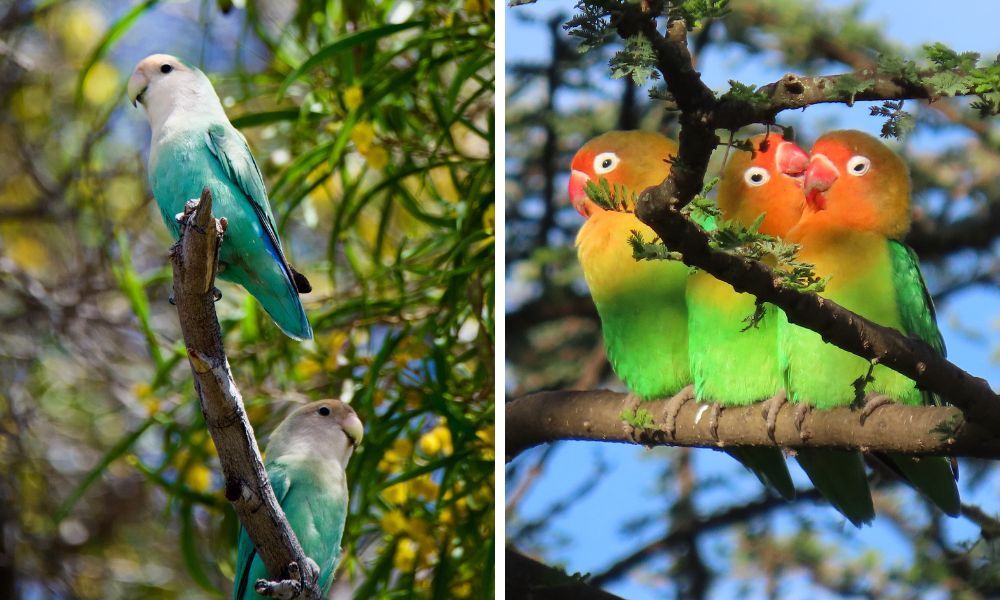
Nectar
Lovebirds in the wild also feed on nectar from flowers. Nectar provides a valuable source of carbohydrates and source minerals that keep them healthy. In captivity, you can offer them a mixture of water and sugar or honey in a bowl, or you can use an open-style feeder to make nectar available for your birds.
Insects
Insects such as termites, ants, and caterpillars offer a rich source of protein for lovebirds. Pets are likely to suffer from nutritional deficiencies if you don’t supplement their diet with protein. You can add boiled egg, mealworms, or cooked chicken to their diet to ensure they receive a proper protein intake.
Grit
Grit in the form of small stones and minerals can aid in digestion. Lovebirds in the wild usually swallow small stones or grit to help break down seeds and other food in the stomach. Crushed eggshells or cuttlebone supplements available in pet stores can provide the necessary grit needed for proper digestion in pet lovebirds.
Meal Planning
To provide your lovebird with optimal nutrition, it’s important to plan out their meals ahead of time. Start by offering seeds as the foundation of their balanced diet, then supplement it with fruits and fresh vegetables for vitamins and minerals. Add in insects or boiled egg for extra protein, and don’t forget the grit for proper digestion. With careful meal planning, you can ensure that your lovebirds are getting the nutrition they need to stay healthy and happy.
Providing your lovebird with a varied diet is essential for their well-being. By understanding the natural diet of lovebirds in the wild, you can ensure that your pet bird receives the proper nutrition they need to stay healthy and happy. With careful meal planning and providing them with plenty of fresh food, you can give them a long and content life together.
By knowing what lovebirds eat in the wild, we can better provide them with a healthy diet and give them a happy, long life. Lovebirds are natural seed-eaters, but they also enjoy fruits and vegetables, nectar, insects, and grit as part of their diet. Feeding your pet lovebird with the right combination of nutrients is essential to keep them healthy and happy. With the right diet, you can ensure that your lovebirds live a long and content life.
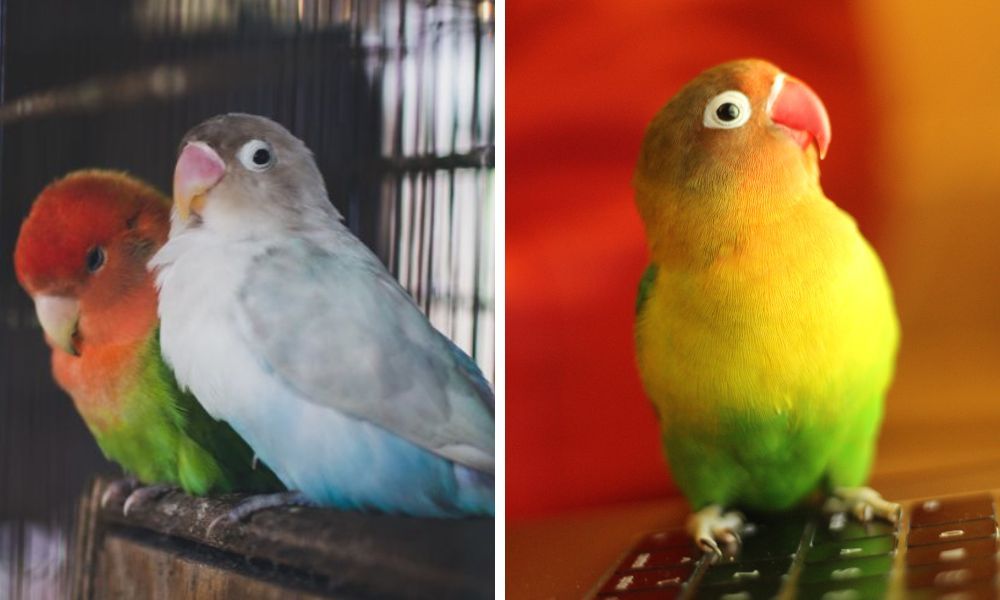
FAQs
What is the best bird food for lovebirds?
The best bird food for lovebirds is a seed-based diet that is supplemented with fruits and vegetables, insects, nectar, and grit. It’s important to provide them with plenty of fresh food to ensure they get the nutrients they need to stay healthy. Adding pellets to your bird's diet will be the perfect addition to the nutrients they are getting from their other nutritious food. A pelleted lovebird food contains all the daily nutrients your lovebird will need in each pellet.
What to keep in mind when feeding lovebirds?
When feeding your lovebirds, it’s important to remember that seeds should not make up more than 50% of their diet. Too many seeds can cause obesity in lovebirds, so it is essential to supplement their diets with other food types like fruits and vegetables, insects, nectar and grit. Additionally, always provide them with fresh water every day and change it frequently to keep them hydrated. Make sure the cage is clean and free of droppings to prevent contamination.
How often should I feed my pet lovebird?
It’s best to feed your pet lovebird two or three times a day, with small amounts of food each time. This will ensure that they get the nutrients they need while avoiding overfeeding. Lovebirds feed primarily on seeds, grains, and fruits in the wild but you can decide whether you want to feed yours a seed mix or pelleted food. The seed mix that you feed your lovebirds should consist of a variety of seeds, not just one type.
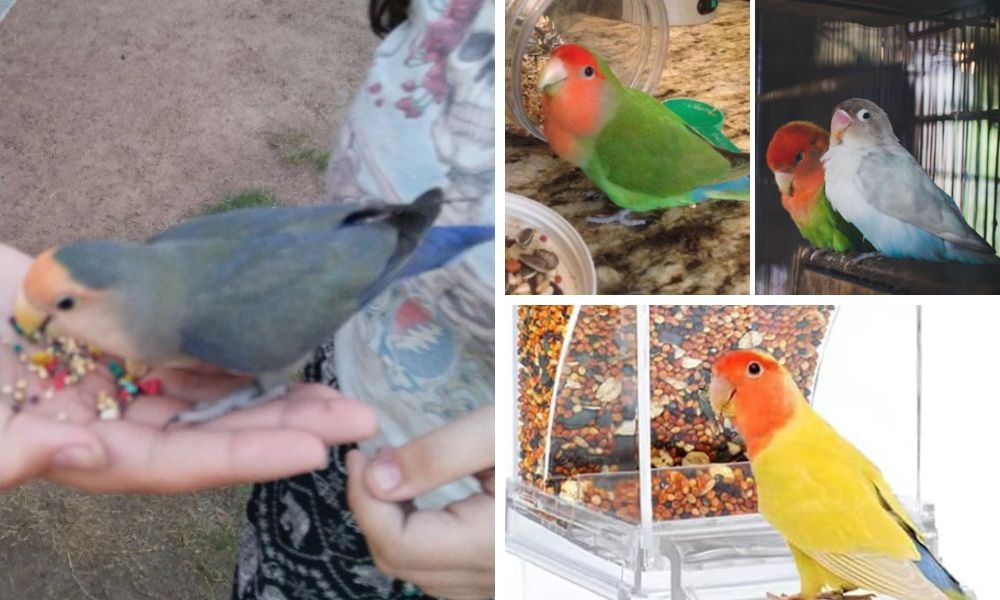
How can I make sure my pet lovebird is getting enough nutrition?
Making sure your pet lovebird is getting the proper nutrition is essential for their health and happiness. Start by offering a seed-based diet supplemented with fruits, vegetables, insects, nectar, and grit. Providing them with plenty of fresh food will ensure that they get the vitamins and minerals they need to stay healthy. Additionally, you can provide cuttlebone or other supplements as needed to ensure they receive the proper nutrients.
What vegetables does love birds eat?
Lovebirds enjoy eating a variety of vegetables such as sweet potato, carrots, spinach, squash, peas and corn. Additionally, they also enjoy occasional treats such as fresh herbs like cilantro and parsley.
What kind of nuts should I feed my pet birds?
Lovebirds enjoy a variety of nuts such as almonds, cashews and walnuts. Nuts are an excellent source of protein and healthy fats that will help keep them strong. However, it is best to give them only a few nuts at a time as too many can cause digestive issues.
Are sunflower seeds good for lovebirds?
Sunflower seeds are a great source of nutrition for lovebirds. However, too many sunflower seeds can cause obesity in lovebirds, so it is important to supplement their diets with other types of lovebird bird food. You can read more about balanced love birds food by clicking the picture below.
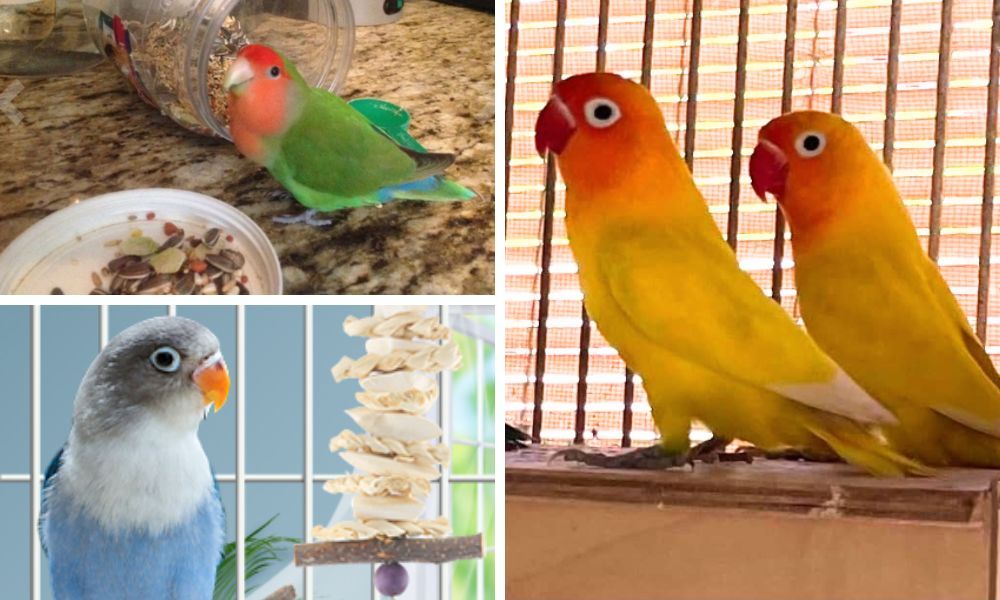
What should I do if my lovebird won’t eat?
If your lovebird isn’t eating, first make sure that you are providing them with bird food that they enjoy such as seeds,fresh fruits and vegetables. Additionally, make sure the food is fresh and that they have access to a clean water source. If the problem persists, it may be best to take your lovebird to an avian veterinarian for further evaluation.
What kind of insects do lovebirds eat?
Lovebirds enjoy eating insects such as termites, ants, and caterpillars as they provide a great source of protein. Insects should only be fed occasionally as too much can cause digestive issues, but they are an excellent way to supplement your pet lovebird's diet with extra protein.
Does my pet lovebird need grit?
Yes, your pet lovebird needs grit to aid in digestion. Grit in the form of small stones and minerals can be found in the wild, but you can also provide commercial grit and cuttlebone supplements available from pet stores. Providing your lovebird with grit is essential for proper digestion.
How to Hand-Feed Baby Lovebirds?
Hand-feeding baby lovebirds is a rewarding experience, but it’s very important to understand the process and take precautions to avoid injury. Before you begin hand-feeding your baby lovebirds, be sure to purchase a special hand-feeding formula from a pet store that is specifically designed for birds. Then warm up the formula to between 95 and 105 degrees Fahrenheit
Can love birds eat rice?
Lovebirds can safely eat cooked white or brown rice. Rice is an excellent source of carbohydrates and essential vitamins and minerals, but it should be fed in moderation and should not replace your lovebird's regular seed-based diet. Additionally, make sure the rice is cooled before feeding to avoid burns.
What should lovebirds not eat?
Lovebirds should not eat avocado, chocolate, and caffeine as these can be toxic to birds. Additionally, they should also avoid sugary treats or foods high in fat and salt. These foods may be safe for humans, but they can cause digestive issues in lovebirds.
Do lovebirds eat banana?
Lovebirds enjoy eating banana as an occasional treat. Banana is packed with vitamins and minerals, but it should be fed in moderation and should not replace their regular seed-based diet. When feeding your lovebirds banana, make sure to remove the peel first, as this can be hard for them to digest.
Can lovebirds eat bread?
Bread can be fed to lovebirds, although it is not an ideal source of nutrition and should only be given as an occasional treat. Bread contains carbohydrates that can provide quick energy, but it does not contain essential vitamins and minerals. Therefore, it is best to supplement bread with other bird food such as fruits and vegetables to ensure your lovebird gets the nutrients they need. You can read more about Best Love Birds Food by clicking the picture below.
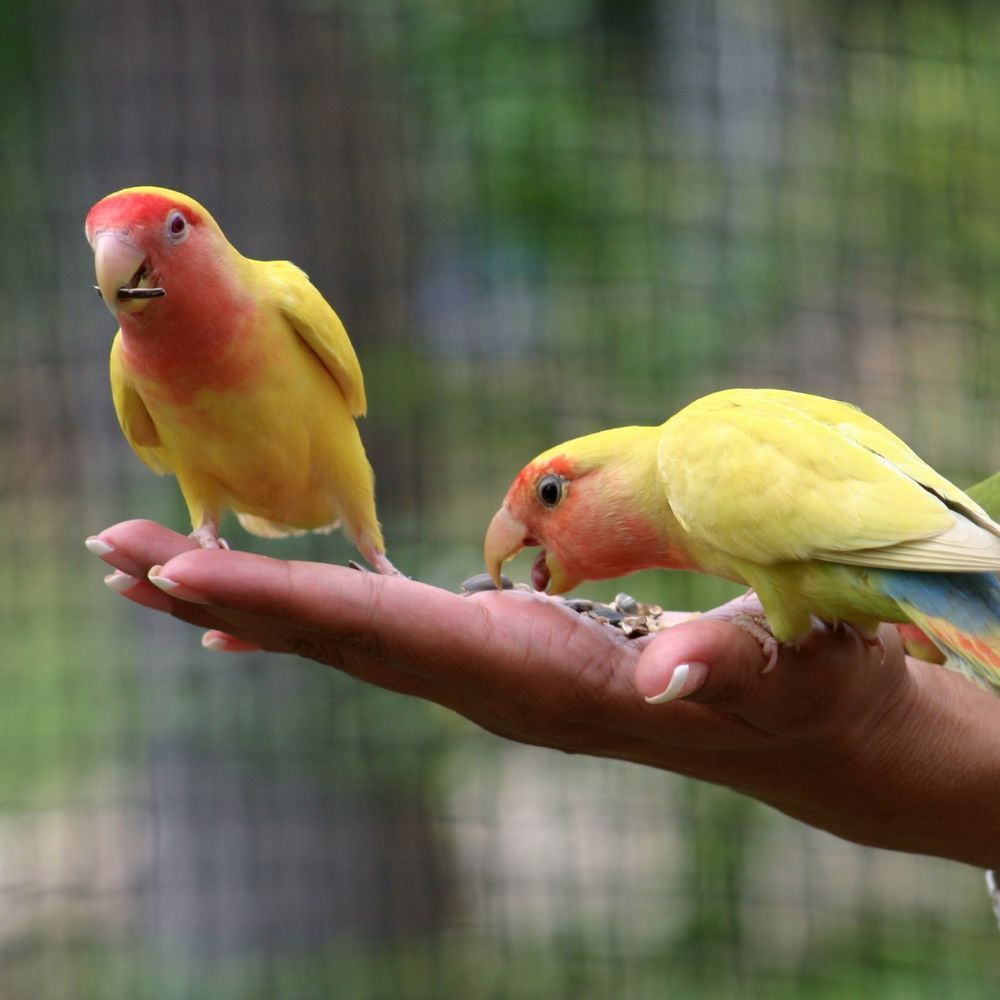
How do you make lovebirds happy?
Lovebirds are social birds and need attention from their owners to stay happy and healthy. Daily interaction such as talking to them, hand-feeding them treats, or providing toys for them to play with will help keep your lovebird content. Additionally, having multiple lovebirds in the same cage can be beneficial as they get the added benefit of companionship from each other.
At the end...
As pet owners, of course, we should always ensure that our lovebirds are well-fed and healthy. Knowing what wild lovebirds eat can provide a guide to their nutritional needs. Lovebirds in the wild have a variety of nutrient-rich foods available to them that can keep them healthy and strong. Mimicking their natural diet of seeds, fruits and vegetables, nectar, insects, and grit can help keep your lovebirds healthy and happy. Remember that they need more than just seeds to survive and thrive. Providing a balanced diet that’s rich in a variety of nutrients will keep your lovebirds healthy, active, and colorful. With a little bit of effort and care, you can create an optimal nutrition plan that gives your lovebird a happier and healthier life! Shop now for Lovebird Bird Food and start saving today.

